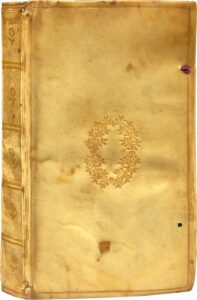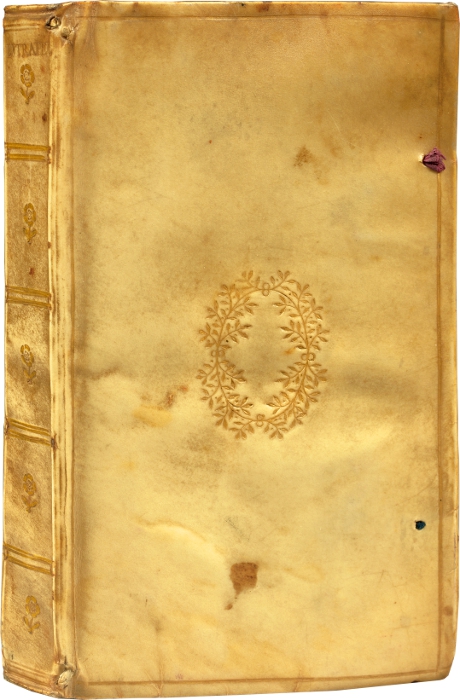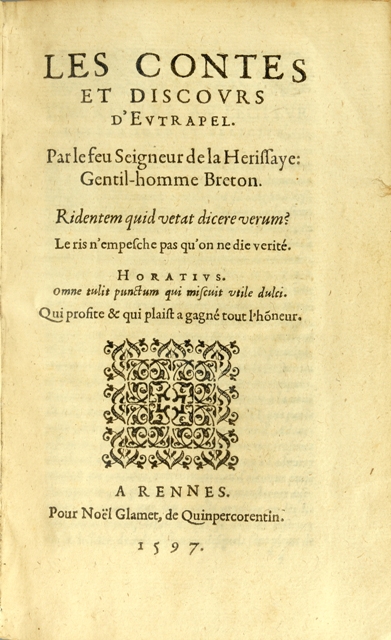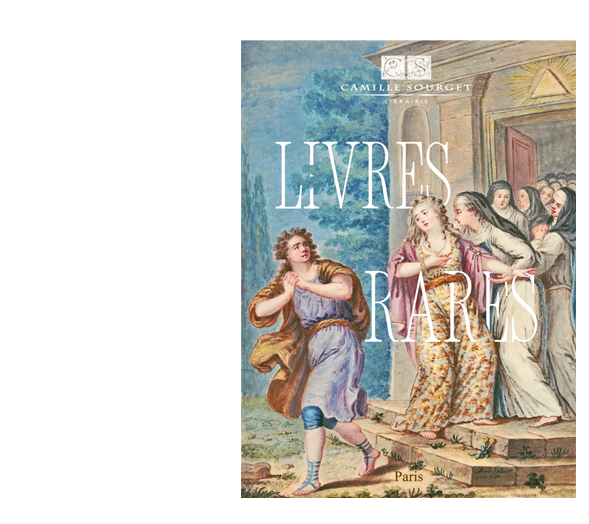DU FAIL, Noël. Les Contes et discours d’Eutrapel. Rennes, pour Noël Glamet de Quinpercorentin, 1597.
8vo [171 x 106 mm] of (4) ll., 223 (there is a gap in the page numbering from 137 to 141 without loss), (1) l., small wormhole in the margin of the 3 last ll. not touching the text. Bound in limp gilt vellum, gilt fillet around the covers, central medallion with a pattern of leaves, flat spine decorated, remains of ties, gilt edges. Contemporary binding.
Very rare edition of the “Contes et discours d’Eutrapel”, a fine reprint of the first edition of 1585. Tchemerzine, III, 110; Brunet, II, 1164.
Noël du Fail, seigneur de La Herissaye, country gentleman (“from the Champagne area”) was born towards 1520 at the manor of Château-Letard, near Rennes.
It is from his mischievous work that came all his glory. “The thirteen ‘Propos rustiques’, published in Lyons in 1547, report the conversations and stories of 4 old fellows, Anselme, Pasquier, Huguet and Lubin who, on festive village days, converse apart lying under a large oak, while the youth frolic about before their gaze. They will talk about old days, absentees and evenings; about the way friendships are turning out; absentees they knew; local quarrels between Flameaux and Vindelles. A good example of country realism. The praise of rustic life is fed by Caton, by Pline and Cicero; by Virgil and Horace. Though the content of the talk seems captured like a fly on the wall, it has a literary form. And the realistic flavour of those peasantries, which owe a lot to Rabelais, but by analogies of vocabulary, is not wasted by it.”
As soon as 1548, the five Baliverneries, ou contes nouveaux d’Eutrapel present the meetings of Eutrapel with his friends Polygame and Lupold. Accommodating and mocking, Eutrapel is a happy drinker who is a reflection of Panurge. A Rabelaisian philosophy emanates from the book, against those who want to “transform their nature”. But those tales are only pastiches of Pantagruel. The same is not true about the 35 Contes et discours d’Eutrapel.
Here are the three fellows of the Baliverneries, of which we find the arguments in the present work: a personal collection of Lessons and Examples, matching the country philosopher (Eutrapel) against the socialite (Polygame) and against the businessman (Lupold). Rabelais’ influence fades out, despite clear marks: the propos de marier Eutrapel (29) recalls the Tiers Livre. “Du Fail often takes up his anecdotes to the common fund of storytellers, his abundant quotes from classic or sacred texts, as well as popular songs. But his talent matured, he now gives to his sayings a large variety of subjects: justice or the gout, music or the love of oneself, without mentioning the digressions. Finally, the work abounds in precious documentary indications.”
“Those spiritually written tales are very realistic and contain some spiciness satires. They are presented as dialogues between Noël du Fail, François du Fail, his brother, and Colin Briand, his professor”. (Rahir, La Bibliothèque de l’amateur, n°1331).
Noël Glamet is an imaginary bookseller and this volume, very well printed, comes from a Parisian printing shop, probably the one of Jean Richer who printed the 1585 edition (see Revue des Livres anciens, II, pp. 312-313).
A magnificent wide-margined copy, perfectly preserved in its fine contemporary limp vellum binding.
Provenance: major Croissandeau’s collection (1929, n°23) and Roux-Spitz (1977, n°44). Typographic ex libris: L. Maurel.



